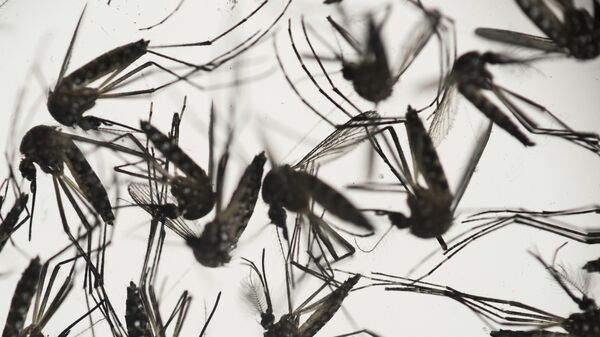The giant zebra-leg mosquitoes, which are two to three times as big as normal bloodsuckers, are scientifically termed Psorophora ciliata — or more commonly as "gallinippers."
— Real News Line (@RealNewsLine) October 2, 2018
According to the University of Florida's entomology website, the mosquitoes lay their eggs in low-lying areas. When these areas flood, the eggs hatch, producing a large number of mosquitoes.
"If you see mosquitoes often, then you're going to say, ‘Wow, that's a big mosquito,'" Michael H. Reiskind, an assistant professor in the Department of Entomology at North Carolina State University, recently told KTLA5.
Although the species is native to the eastern US, they are not commonly encountered under normal circumstances, according to Reiskind.
— ~Marietta️ (@MariettaPosts) October 1, 2018
"In general, they're pretty rare, I would say, under normal circumstances. But when you get hurricanes, you get such a large boom in the population from the flood that suddenly, everybody notices them."
However, the good news is that members of the species are unlikely to host diseases that are harmful to humans.
"They can carry dog heartworm, but in general, they don't actually carry human diseases," Reiskind added.
"That being said, being bitten by a giant mosquito or being bitten hundreds of times by a giant mosquito can be, in and of itself, a public health issue," he said, adding that some people react very badly to mosquito bites.
— Tito (@pheonixchris58) October 2, 2018
On Wednesday, North Carolina Gov. Roy Cooper ordered $4 million in funding for mosquito control efforts in 27 counties that have been severely affected by Florence.
Scott Harrelson, the health director of Craven County, one of the areas most affected by Florence, praised Cooper for providing "a critical public health service" in the wake of the mosquito invasion.
"This has been a serious issue for our county and many others impacted by Hurricane Florence," Cooper is quoted as saying by the Huffington Post.
— Kan Gup (@GupKan) October 2, 2018
North Carolina's Department of Health and Human Services has also released tips on its website on how to deal with the mosquito invasion. The recommendations include wearing long-sleeved shirts and long pants while outdoors, as well as using mosquito repellants when outside.
The Departments of Entomology at North Carolina State University and the University of Florida did not immediately respond to requests for comment.


